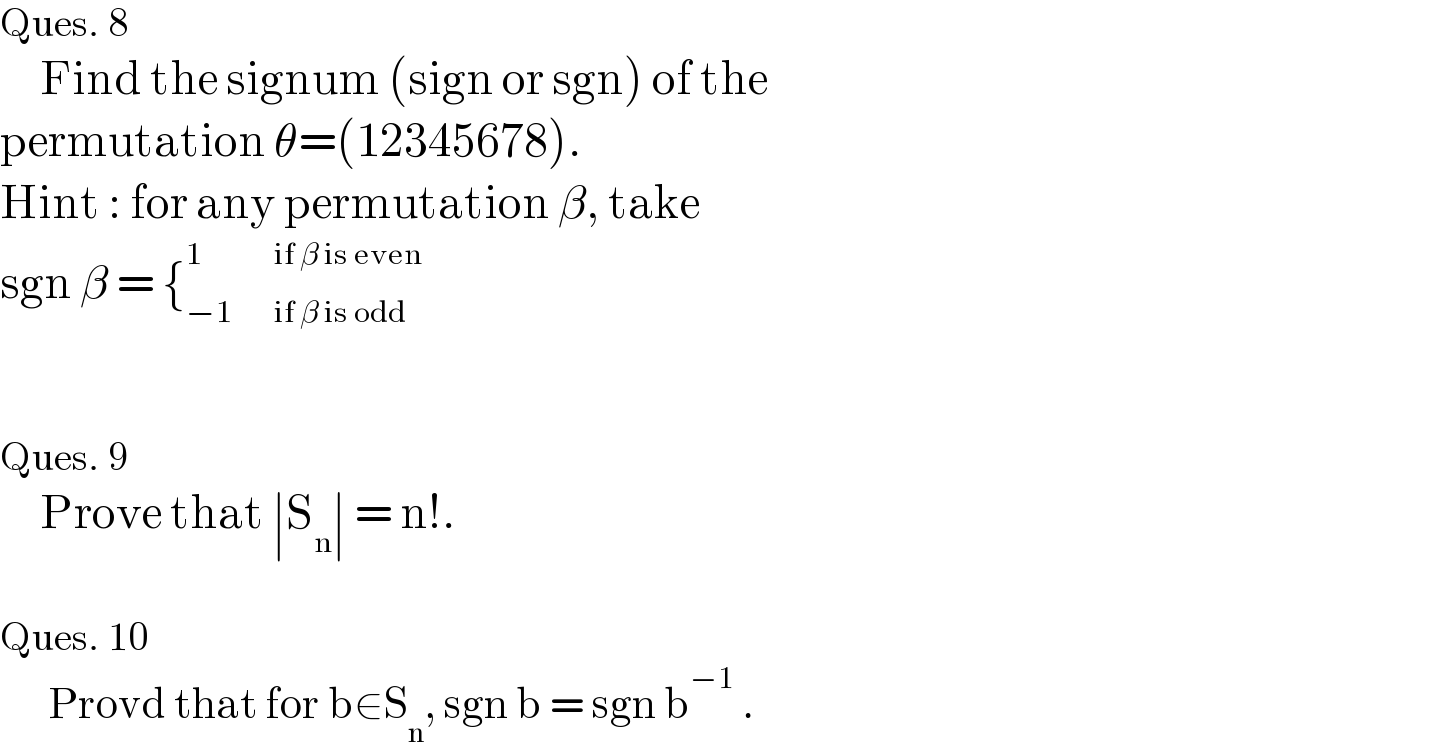
Question Number 193871 by Mastermind last updated on 21/Jun/23

$$\mathrm{Ques}.\:\mathrm{8}\: \\ $$$$\:\:\:\:\:\mathrm{Find}\:\mathrm{the}\:\mathrm{signum}\:\left(\mathrm{sign}\:\mathrm{or}\:\mathrm{sgn}\right)\:\mathrm{of}\:\mathrm{the} \\ $$$$\mathrm{permutation}\:\theta=\left(\mathrm{12345678}\right). \\ $$$$\mathrm{Hint}\::\:\mathrm{for}\:\mathrm{any}\:\mathrm{permutation}\:\beta,\:\mathrm{take} \\ $$$$\mathrm{sgn}\:\beta\:=\:\left\{_{−\mathrm{1}\:\:\:\:\:\:\:\mathrm{if}\:\beta\:\mathrm{is}\:\mathrm{odd}} ^{\mathrm{1}\:\:\:\:\:\:\:\:\:\:\:\:\mathrm{if}\:\beta\:\mathrm{is}\:\mathrm{even}} \right. \\ $$$$ \\ $$$$ \\ $$$$\mathrm{Ques}.\:\mathrm{9} \\ $$$$\:\:\:\:\:\mathrm{Prove}\:\mathrm{that}\:\mid\mathrm{S}_{\mathrm{n}} \mid\:=\:\mathrm{n}!. \\ $$$$ \\ $$$$\mathrm{Ques}.\:\mathrm{10} \\ $$$$\:\:\:\:\:\:\mathrm{Provd}\:\mathrm{that}\:\mathrm{for}\:\mathrm{b}\in\mathrm{S}_{\mathrm{n}} ,\:\mathrm{sgn}\:\mathrm{b}\:=\:\mathrm{sgn}\:\mathrm{b}^{−\mathrm{1}} \:. \\ $$
Commented by talminator2856792 last updated on 23/Jun/23

$$\:\:\mathrm{what}\:\mathrm{is}\:\mathrm{source}\:\mathrm{of}\:\mathrm{these}\:\mathrm{questions}.\:\: \\ $$$$\:\:\mathrm{or}\:\mathrm{book}\:\mathrm{name}. \\ $$
Answered by Rajpurohith last updated on 22/Jun/23
![(8) Clearly θ=(18)(17)(16)(15)(14)(13)(12) which shows θ is an odd permutation. hence sgn(θ)=−1. ■ (9) S_n denotes the set of all permutations of a set of n elements say A={1,2,3,...n}. [you know that S_n forms a group under function composition.] let σ∈S_n , so σ is a bijection. How many choices do you have for σ(1)? You have n choices. And for σ(2)? It must be (n−1) choices. because you cannot choose the one you choosed for σ(1). [Suppose you choose σ(2)=σ(1) , ⇒2=1 as σ is bijective.] so you cannot. similarly there are (n−2) choices for σ(3). . . . There are 2 choices for σ(n−1) And only one choice for σ(n). By fundamental principle of counting, we have n(n−1)(n−2)...2.1=n! such permutations on n letters and they are the only permutations. ⇒∣S_n ∣=n! ■ (10)Let β∈S_n . Suppose β is even . ⇒βoβ^(−1) =Id ⇒sgn(βoβ^(−1) )=sgn(Id)=1 Suppose β^(−1 ) is odd ⇒βoβ^(−1) is odd ⇒sgn(βoβ^(−1) )=−1, a contradiction. Hence β^(−1 ) is not odd ⇒β^(−1) must be even. ⇒sgn(β^(−1) )=1=sgn(β) Similar argument for odd. ■](Q193888.png)
$$\left(\mathrm{8}\right)\:{Clearly}\:\theta=\left(\mathrm{18}\right)\left(\mathrm{17}\right)\left(\mathrm{16}\right)\left(\mathrm{15}\right)\left(\mathrm{14}\right)\left(\mathrm{13}\right)\left(\mathrm{12}\right) \\ $$$${which}\:{shows}\:\theta\:{is}\:{an}\:\boldsymbol{{odd}}\:{permutation}. \\ $$$${hence}\:{sgn}\left(\theta\right)=−\mathrm{1}.\:\:\:\blacksquare \\ $$$$\left(\mathrm{9}\right)\:{S}_{{n}} \:{denotes}\:{the}\:{set}\:{of}\:{all}\:{permutations}\:{of} \\ $$$${a}\:{set}\:{of}\:{n}\:{elements}\:{say}\:{A}=\left\{\mathrm{1},\mathrm{2},\mathrm{3},...{n}\right\}. \\ $$$$\left[{you}\:{know}\:{that}\:{S}_{{n}} \:{forms}\right. \\ $$$$\left.{a}\:{group}\:{under}\:{function}\:{composition}.\right] \\ $$$${let}\:\sigma\in{S}_{{n}} \:,\:{so}\:\sigma\:{is}\:{a}\:{bijection}. \\ $$$${How}\:{many}\:{choices}\:{do}\:{you}\:{have}\:{for}\:\sigma\left(\mathrm{1}\right)? \\ $$$$\boldsymbol{{You}}\:\boldsymbol{{have}}\:\boldsymbol{{n}}\:\boldsymbol{{choices}}. \\ $$$${And}\:{for}\:\sigma\left(\mathrm{2}\right)? \\ $$$$\boldsymbol{{It}}\:\boldsymbol{{must}}\:\boldsymbol{{be}}\:\left(\boldsymbol{{n}}−\mathrm{1}\right)\:\boldsymbol{{choices}}. \\ $$$${because}\:{you}\:{cannot}\:{choose}\:{the}\:{one}\:{you}\:{choosed} \\ $$$${for}\:\sigma\left(\mathrm{1}\right). \\ $$$$\left[{Suppose}\:{you}\:{choose}\:\sigma\left(\mathrm{2}\right)=\sigma\left(\mathrm{1}\right)\:,\right. \\ $$$$\left.\Rightarrow\mathrm{2}=\mathrm{1}\:{as}\:\sigma\:{is}\:{bijective}.\right] \\ $$$${so}\:{you}\:{cannot}. \\ $$$${similarly}\:{there}\:{are}\:\left({n}−\mathrm{2}\right)\:{choices}\:{for}\:\sigma\left(\mathrm{3}\right). \\ $$$$. \\ $$$$. \\ $$$$. \\ $$$${There}\:{are}\:\mathrm{2}\:{choices}\:{for}\:\sigma\left({n}−\mathrm{1}\right) \\ $$$${And}\:{only}\:{one}\:{choice}\:{for}\:\sigma\left({n}\right). \\ $$$${By}\:{fundamental}\:{principle}\:{of}\:{counting}, \\ $$$${we}\:{have}\:{n}\left({n}−\mathrm{1}\right)\left({n}−\mathrm{2}\right)...\mathrm{2}.\mathrm{1}=\boldsymbol{{n}}!\:{such}\:{permutations} \\ $$$${on}\:{n}\:{letters}\:{and}\:{they}\:{are}\:{the}\:{only}\:{permutations}. \\ $$$$\Rightarrow\mid\boldsymbol{{S}}_{\boldsymbol{{n}}} \mid=\boldsymbol{{n}}!\:\:\:\:\:\:\:\:\blacksquare \\ $$$$ \\ $$$$\left(\mathrm{10}\right){Let}\:\beta\in{S}_{{n}} .\:{Suppose}\:\beta\:{is}\:{even}\:. \\ $$$$\Rightarrow\beta{o}\beta^{−\mathrm{1}} ={Id} \\ $$$$\Rightarrow{sgn}\left(\beta{o}\beta^{−\mathrm{1}} \right)={sgn}\left({Id}\right)=\mathrm{1} \\ $$$${Suppose}\:\beta^{−\mathrm{1}\:} {is}\:{odd}\: \\ $$$$\Rightarrow\beta{o}\beta^{−\mathrm{1}} \:{is}\:{odd}\:\Rightarrow{sgn}\left(\beta{o}\beta^{−\mathrm{1}} \right)=−\mathrm{1},\:{a}\:{contradiction}. \\ $$$${Hence}\:\beta^{−\mathrm{1}\:} \:{is}\:{not}\:{odd} \\ $$$$\Rightarrow\beta^{−\mathrm{1}} \:{must}\:{be}\:{even}. \\ $$$$\Rightarrow{sgn}\left(\beta^{−\mathrm{1}} \right)=\mathrm{1}={sgn}\left(\beta\right)\:\:\: \\ $$$${Similar}\:{argument}\:{for}\:{odd}.\:\:\:\:\:\:\blacksquare \\ $$$$ \\ $$$$ \\ $$$$ \\ $$
Commented by Mastermind last updated on 22/Jun/23

$$\mathrm{Thank}\:\mathrm{you}\:\mathrm{so}\:\mathrm{much} \\ $$
Commented by York12 last updated on 22/Jun/23

$${sir}\:{I}\:{am}\:{facing}\:{a}\:{lot}\:{of}\:{problems}\:{with}\:{combinatorics} \\ $$$${what}\:{do}\:{you}\:{recommend}\:{to}\:{read} \\ $$
Commented by Rajpurohith last updated on 22/Jun/23

$$\boldsymbol{{I}}\:\boldsymbol{{would}}\:\boldsymbol{{better}}\:\boldsymbol{{suggest}}\:\boldsymbol{{you}}\:\boldsymbol{{to}}\:\boldsymbol{{study}} \\ $$$$\boldsymbol{{one}}\:\boldsymbol{{book}}\:\boldsymbol{{properly}}\:\boldsymbol{{as}}\:\boldsymbol{{a}}\:\boldsymbol{{course}}. \\ $$
Commented by talminator2856792 last updated on 23/Jun/23

$$\:\:\mathrm{what}\:\mathrm{book}\:\mathrm{do}\:\mathrm{you}\:\mathrm{recommend}.\:\: \\ $$
Commented by York12 last updated on 23/Jun/23

$${what}\:{book}\:{do}\:{you}\:{recommend}\:{sir} \\ $$$$ \\ $$
Commented by Rajpurohith last updated on 24/Jun/23

$$\boldsymbol{{Actually}}\:\boldsymbol{{I}}\:\boldsymbol{{did}}\:\boldsymbol{{not}}\:\boldsymbol{{have}}\:\boldsymbol{{a}}\:\boldsymbol{{course}}\:\boldsymbol{{in}}\:\boldsymbol{{it}}, \\ $$$$\boldsymbol{{But}}\:\boldsymbol{{I}}\:'\boldsymbol{{d}}\:\boldsymbol{{suggest}}\:\boldsymbol{{the}}\:\boldsymbol{{book}}\:``\boldsymbol{{Introductory}} \\ $$$$\boldsymbol{{Combinatorics}}''\:\boldsymbol{{by}}\:\boldsymbol{{Richard}}\:.\boldsymbol{{A}}\:\boldsymbol{{Brualdi}}. \\ $$
Commented by York12 last updated on 23/Jul/23

$${thanks} \\ $$
